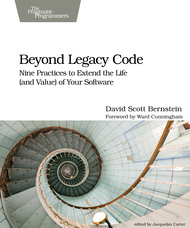274 pages
English language
Published Sept. 5, 2015 by Pragmatic Programmers, LLC, The.

274 pages
English language
Published Sept. 5, 2015 by Pragmatic Programmers, LLC, The.
These nine practices could save the software industry. Beyond Legacy Code is filled with practical, hands-on advice and a common-sense exploration of why technical practices such as refactoring and test-first development are critical to building maintainable software. Discover how to avoid the pitfalls teams encounter when adopting these practices, and how to dramatically reduce the risk associated with building software—realizing significant savings in both the short and long term. With a deeper understanding of the principles behind the practices, you’ll build software that’s easier and less costly to maintain and extend.
By adopting these nine key technical practices, you’ll learn to say what, why, and for whom before how; build in small batches; integrate continuously; collaborate; create CLEAN code; write the test first; specify behaviors with tests; implement the design last; and refactor legacy code.
Software developers will find hands-on, pragmatic advice for writing higher quality, more maintainable, and bug-free …
These nine practices could save the software industry. Beyond Legacy Code is filled with practical, hands-on advice and a common-sense exploration of why technical practices such as refactoring and test-first development are critical to building maintainable software. Discover how to avoid the pitfalls teams encounter when adopting these practices, and how to dramatically reduce the risk associated with building software—realizing significant savings in both the short and long term. With a deeper understanding of the principles behind the practices, you’ll build software that’s easier and less costly to maintain and extend.
By adopting these nine key technical practices, you’ll learn to say what, why, and for whom before how; build in small batches; integrate continuously; collaborate; create CLEAN code; write the test first; specify behaviors with tests; implement the design last; and refactor legacy code.
Software developers will find hands-on, pragmatic advice for writing higher quality, more maintainable, and bug-free code. Managers, customers, and product owners will gain deeper insight into vital processes. By moving beyond the old-fashioned procedural thinking of the Industrial Revolution, and working together to embrace standards and practices that will advance software development, we can turn the legacy code crisis into a true Information Revolution.